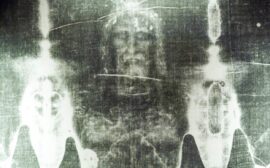 The most basic and fundamentally essential belief in the Christian worldview is the acceptance of a theistic God. This article will examine the first essential doctrine to the Christian faith: the existence of God. The article will define what the doctrine entails, why a person can believe the doctrine, and why the doctrine is considered essential.
The most basic and fundamentally essential belief in the Christian worldview is the acceptance of a theistic God. This article will examine the first essential doctrine to the Christian faith: the existence of God. The article will define what the doctrine entails, why a person can believe the doctrine, and why the doctrine is considered essential.
What Is the Doctrine?
The doctrine of God’s existence is critical to the Christian worldview. It is, in fact, foundational to the remaining doctrines of the Christian faith. If God does not exist, then there is no use moving further. Yet, if God does exist, then there is a foundation to all other religious doctrines.
The doctrine of God that needs to hold true for the Christian faith is that of theism. Norman Geisler explains theism as, “…the worldview that an infinite, personal God created the universe and miraculously intervenes in it from time to time (see Miracle). God is both transcendent over the universe and immanent in it” (Geisler BECA 1999, 722). Geisler mentions that theism holds that God is both transcendent and immanent. These elements of belief in God are essential to the Christian doctrine. One could prove God’s existence without proving Christianity, but one cannot prove Christianity without proving the existence of a theistic God. Transcendence means that God exists as a separate entity from the universe. In contrast to pantheistic religions, God exists apart from the universe. Therefore, the universe is a creation of God. Immanence describes God’s working within the universe. Deists, like Thomas Jefferson, believe in God’s existence, but do not hold that God works within creation. Creation is like a wound-up clock and is ticking apart from God on its’ own. However, theists understand that God works in creation. God reveals God’s self to human beings (e.g. revelation). This is critical in understanding doctrines such as sin and the incarnation of Christ.
Why Should a Person Believe the Doctrine?
The Bible states, “In the beginning God created the heavens and the earth” (Genesis 1:1). The Psalmist writes, “The heavens proclaim the glory of God. The skies display his craftsmanship. Day after day they continue to speak; night after night they make him known” (Psalm 19:1-2). The Bible clearly shows that God exists. But is there any reason for believing in a theistic God outside the Bible? Actually, yes…there is.
Transcendent God
Is there evidence that God exists? If you have followed this website for any lengths of time, then you know that there are multiple reasons for believing in God’s existence (see article “30 Abbreviated Arguments for the Existence of God”). However, we will still grant one of the reasons for believing that God is the transcendent creator of the universe.
A powerful argument for God’s transcendent existence is the Argument from Efficient Causality. Peter Kreeft explains,
“We notice that some things cause other things to be (to begin to be, to continue to be, or both)….Existence is like a gift given from cause to effect. If there is not one who has the gift, the gift cannot be passed down the chain of receivers, however long or short the chain may be…If there is no God who has existence by his own eternal nature, then the gift of existence cannot be passed down the chain of creatures and we can never get it. But we do get it; we exist. Therefore there must exist a God: and Uncaused Being who does not have the receive existence like us—and like every other link in the chain of receivers” (Kreeft and Tacelli 1994, 51).
Perhaps the most popular argument in recent times that shows forth efficient causality is the Kalam Cosmological Argument. The Kalam Argument argues: 1) Everything that begins to exist has a cause. 2) The universe began to exist. 3) Therefore, the universe has a cause. The Big Bang Theory shows that the universe holds an absolute beginning in space-time history. Some argue that a multiverse (M-Theory) exists which could hold several mini-universes of which ours is one. However, such a theory only pushes back the “God problem” one step. Robin Collins explains,
“Although some of the laws of physics can vary from universe to universe in superstring/M-Theory, these fundamental laws and principles underlie superstring/M-Theory and therefore cannot be explained as a multiverse selection effect. Further, since the variation among universes would consist of variation of the masses and types of particles, and the form of the forces between them, complex structures would almost certainly be atomlike and stable energy sources would almost certainly require aggregates of matter. Thus, the said fundamental laws seem necessary for there to be life in any of the many universes generated in this scenario, not merely in a universe with our specific types of particles and forces. In sum, even if an inflationary-superstring multiverse generator exists, it must have just the right combination of laws and fields for the production of life-permitting universes: if one of the components were missing or different, such as Einstein’s equation or the Pauli Exclusion Principle, it is unlikely that any life-permitting universes could be produced. Consequently, at most, this highly speculative scenario would explain the fine-tuning of the constants of physics, but at the cost of postulating additional fine-tuning of the laws of nature” (Collins 2012, 264-265).
In other words, even a multiverse where a generator existed to produce other universes would require fine-tuning and would, therefore, require a creator. In addition, the Borg-Vilenkin-Guth theorem (BVG) demonstrates that all universes…including a multiverse…would require a beginning point. So, really, a transcendent God is required for M-Theory, or a multiverse, to exist as much as just this universe alone. There are many more arguments for the existence of God (for a listing of 30 arguments for God’s existence, see “30 Abbreviated Arguments for the Existence of God”).
Immanence of God
How does one know that God is immanent? There are a few ways that one can know that God is immanent, or personal. One, if the human soul (consciousness) exists, then it must have been placed there for personal reasons. Consciousness is something that baffles modern skeptics. Thomas Nagel, an atheist, recently wrote a book titled Mind and Cosmos: Why the Materialist Neo-Darwinian Conception of Nature is Almost Certainly False. In the book, Nagel explains that atheists are going to have to consider the fact that a human soul, or consciousness, exists. Why would God create such a consciousness in human beings? A good answer would be that God could have a personal relationship with God. Also, near-death experiences (NDEs) would demonstrate the consciousness (soul) of human beings existing outside the material bodies of human beings.
Two, miracles would be a great way to show that God is personal. If only one miracle occurs, then one would have enough to claim that God is personal. There are a multitude of miracles that can be concurred (see Craig Keener’s book Miracles: The Credibility of the New Testament Accounts). One of the greatest is the miracle of the resurrection of Jesus Christ (see articles on this website devoted to the resurrection of Christ).
Finally, personal experiences with God would demonstrate that God is personal. Thousands of cases exist across the globe of individuals who have had personal experiences with the divine. A recent phenomenon is that of visions of Christ. Many have visions of Christ that lead the person to faith. These are not isolated experiences either. The personal experiences and encounters with God show that God is personal. The transcendence and immanence of God leads one towards theism. This does not necessarily prove the Christian worldview…other essential doctrines are necessary to do such. However, this shows that Christianity is at least credible.
Why is the Doctrine Essential?
The doctrine of God’s existence is essential. Perhaps it is one of the most essential doctrines of all. How can one claim that Jesus is the Son of God if one does not believe in God? Otherwise, one would say that Jesus is a son. Well, that’s good, but you do not have Christianity in such a case. The belief in God is also critical in understanding the value of every human being. When God is understood to be transcendent AND immanent, then one will be able to acknowledge that everything in this universe has a purpose. It might be that the person does not understand the purpose of a particularly thing…but there is a purpose nonetheless. The fact that every human being possesses a God-given soul shows that each person holds great importance. It is inescapable that a theistic belief in God is essential in Christianity.
Bibliography
All Scripture, unless otherwise noted, comes from Tyndale House Publishers, Holy Bible: New Living Translation, 3rd ed. Carol Stream, IL: Tyndale House Publishers, 2007.
Chilton, Brian. “30 Abbreviated Arguments for the Existence of God.” pastorbrianchilton.wordpress.com. (October 2013). Accessed January 20, 2014. http://pastorbrianchilton.wordpress.com/2013/10/21/30-abbreviated-arguments-for-the-existence-of-god/.
Collins, Robin. “The Teleological Argument.” The Blackwell Companion to Natural Theology. Edited by William Lane Craig and J. P. Moreland. West Sussex, UK: Wiley-Blackwell, 2012.
Geisler, Norman L. Baker Encyclopedia of Christian Apologetics, Baker Reference Library (Grand Rapids, MI: Baker Books, 1999), 722.
Kreeft, Peter, and Ronald K. Tacelli. Handbook of Christian Apologetics: Hundreds of Answers to Crucial Questions. Downers Grove: IVP, 1994.





[…] Essential Doctrines (Part 1): The Doctrine of God’s Existence […]
[…] Essential Doctrines (Part 1): The Doctrine of God’s Existence […]
[…] Obviously, before one could accept the kingdom of God as a reality, the existence of God would need to be demonstrated. See the article “Essential Doctrines (Part 1): The Doctrine of God’s Existence” found at http://pastorbrianchilton.wordpress.com/2014/01/20/essential-doctrines-part-1-the-doctrine-of-gods-e…. […]
[…] Obviously, before one could accept the kingdom of God as a reality, the existence of God would need to be demonstrated. See the article “Essential Doctrines (Part 1): The Doctrine of God’s Existence” found at http://pastorbrianchilton.wordpress.com/2014/01/20/essential-doctrines-part-1-the-doctrine-of-gods-e…. […]
[…] Essential Doctrines (Part 1): The Doctrine of God’s Existence (pastorbrianchilton.wordpress.com) The doctrine of God that needs to hold true for the Christian faith is that of theism. Norman Geisler explains theism as, “…the worldview that an infinite, personal God created the universe and miraculously intervenes in it from time to time (see Miracle). God is both transcendent over the universe and immanent in it” (Geisler BECA 1999, 722). Geisler mentions that theism holds that God is both transcendent and immanent. These elements of belief in God are essential to the Christian doctrine. One could prove God’s existence without proving Christianity, but one cannot prove Christianity without proving the existence of a theistic God. Transcendence means that God exists as a separate entity from the universe. In contrast to pantheistic religions, God exists apart from the universe. Therefore, the universe is a creation of God. Immanence describes God’s working within the universe. Deists, like Thomas Jefferson, believe in God’s existence, but do not hold that God works within creation. Creation is like a wound-up clock and is ticking apart from God on its’ own. However, theists understand that God works in creation. God reveals God’s self to human beings (e.g. revelation). […]
You say the existence of God and the understanding doctrines such as sin and the incarnation of Christ are connected with each other. Though according to the Scriptures God does not like incarnation and Christ is not God on earth but the son of God on earth.
There are lots of lovers of God who follow His teachings and believe His Words but do not believe in human doctrinal teachings and here-says as the Holy Trinity, hell as being part of a torture place for damned people etc.
Thank you for your post. Before I respond, I need some clarification from some of your statements. What do you mean that “God doesn’t like the incarnation”? What Scriptural evidence can you provide for that statement? Furthermore, loving God…as we shall see…is not enough to possess eternal life. As far as the issues with the trinity…let’s wait until the upcoming article on the trinity (the 7th installment in this series), where I plan to provide scriptural evidence to support the doctrine, before we discuss such issues. The 8th issue of eternity may be changed to the kingdom of God. It is being worked on as we speak.
You say the existence of God and the understanding doctrines such as sin and the incarnation of Christ are connected with each other. Though according to the Scriptures God does not like incarnation and Christ is not God on earth but the son of God on earth.
There are lots of lovers of God who follow His teachings and believe His Words but do not believe in human doctrinal teachings and here-says as the Holy Trinity, hell as being part of a torture place for damned people etc.
Thank you for your post. Before I respond, I need some clarification from some of your statements. What do you mean that “God doesn’t like the incarnation”? What Scriptural evidence can you provide for that statement? Furthermore, loving God…as we shall see…is not enough to possess eternal life. As far as the issues with the trinity…let’s wait until the upcoming article on the trinity (the 7th installment in this series), where I plan to provide scriptural evidence to support the doctrine, before we discuss such issues. The 8th issue of eternity may be changed to the kingdom of God. It is being worked on as we speak.